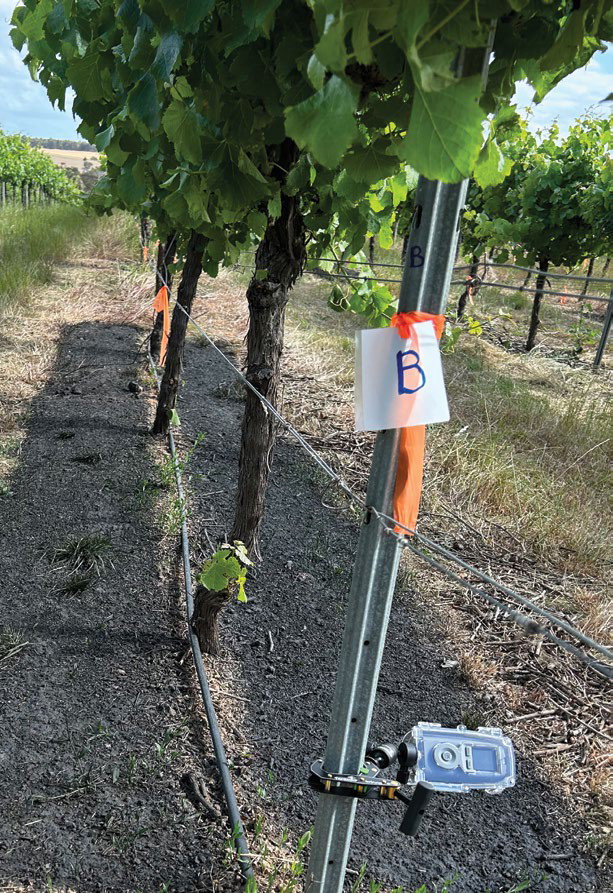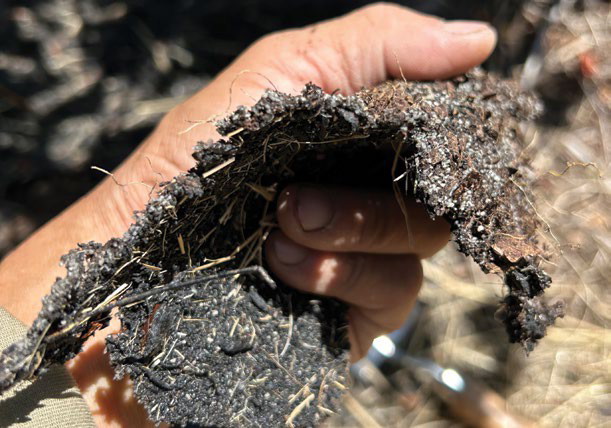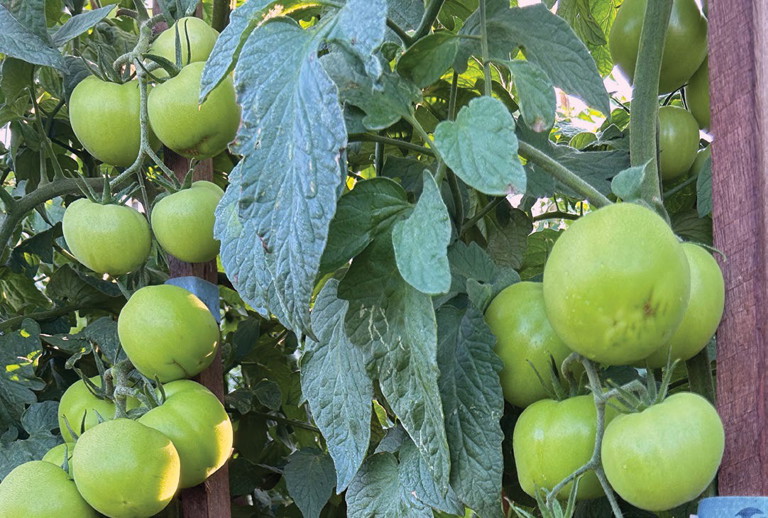BUSINESS sustainability
Mulches ain’t
MULCHES
Plastic mulch may soon become a thing of the past with a new biodegradable option emerging onto the sustainable farming scene.
Words Truyen Vo, DPIRD research scientist
SINCE the 1960s, plastic mulches have been a staple in horticulture production. Currently, about 14,000 hectares of farmland throughout Australia is covered in this plastic. However, it only lasts one season. Every year, more than 40,000 tonnes of plastic mulch is thrown out. It can’t be recycled, burnt or put into landfill.

The mulch is currently being trialled in vineyards, plus butternut pumpkin and tomato crops.
Joining the global race for plastic alternatives, the CSIRO has developed a sprayable biodegradable membrane called TranspiratiONal-SBM. It’s a ‘spray and walk away’ solution to mimicing the benefits of plastic – controlling weeds, increasing crop yields, conserving water – without the massive environmental impact.
There are many benefits to using mulch, including soil temperature modulation, enhanced produce quality, improved soil water management by reduced evaporation, reduced fertiliser leaching, earlier crop production, higher yields, reduced soil erosion, better management of certain insect pests and fewer weed problems. Plastics have been widely used because they are quite inexpensive and there are well-developed crop management systems, including tractors and other machinery, specifically designed to work with and through plastic mulch.
However, due to the fact plastic is made from petro-chemicals, releases toxins from manufacture to field, is non-newable and is not biodegradable, it’s placing a huge toll on the environment. Of course, there are other issues around disposal: it can’t be disposed of through burning due to off-gassing, it can’t be put into landfill due to the length of time it takes to break down and recycling is difficult due to organic, moisture and chemical residues. So, an alternative will be a huge win for the environment and the grower.

The spray-on mulch
breaks down into the soil,
with no negtive
side-effects for the soil.
The new TranspiratiONal-SBM product is currently being trialled by the Department of Primary Industries and Regional Development (DPIRD). It’s classified as a novel, semi-commercialised Sprayable Biodegradable Polymer Membrane (SBPM). Designed by the CSIRO, DPIRD is supporting its use as a tool for sustainable farming.

“ It’s a ‘spray and walk away’ solution to mimicing the benefits of plastic… without the massive environmental impact ”
Currently there are two demonstration sites on butternut pumpkin and tomato crops in Carnarvon, two table grape demonstration sites in the Swan Valley and two wine grape vineyards in the Margaret River and Frankland River regions. There is also a trial to assess the suitability of SBMM for topsoil stabilisation during the establishment of carrot seedlings cultivated in sandy soils.
DPIRD has been collecting final crop data to incorporate with additional measurements, such as soil moisture, soil temperature and soil EC, taken during growing seasons to understand the full impacts of the biodegradable mulch as compared to plastic mulch and other conventional practices.
With irrigated crops in the South West of Western Australia, including wine and table grapes, citrus and vegetables, vulnerable to climate change and representing $900m to WA’s economy, we have our hopes pinned on positive results.
Initial trials have been positive, with biodegradation rates of the membrane ‘tuneable’ with the polymer substrate dispersing and breaking down naturally after a crop cycle with the help of a soil microbiome.
DPIRD supports the adoption of biodegradable mulch technology in vegetable and perennial fruit enterprises, and is happy to talk with interested growers on the results that have been attained in on-farm trials.
Conventional vs Sustainable Mulch
Plastic Mulch
• Not biodegradable in fields
• Degrades into fragments and microbead plastics with continual leaching of toxic additives and heavy metals
• Only suited to manually harvested row crops
• In place for entire growing season. Deteriorated fragments can harm microbiota and organisms, depleting organic matter and increasing water repellence
• Costly application using highly specialised machinery with limited flexibility
• Costly retrieval processes
• Wasteful dumping that requires incineration or buried in landfills
TranspiratiONal-SBM
• Completely biodegradable in fields
• Breaks down completely into naturally occurring by-products, such as gases, water, biomass and inorganic salts
• Can be applied to manually or mechanically harvested row or broadacre crops
• No negative impacts on soil or water systems, microbiota or soil organisms
• Simple and flexible application processes with farmers able to determine depth, thickness and width of the coverage using simple hand-held spray or conventional spray rig
• No retrieval needed, breaks down completely into natural by-products
• Breaks down into natural by-products
MORE INFORMATION
Contact Truyen Vo on 0408 639 680 or email truyen.vo@dpird.wa.gov.au.